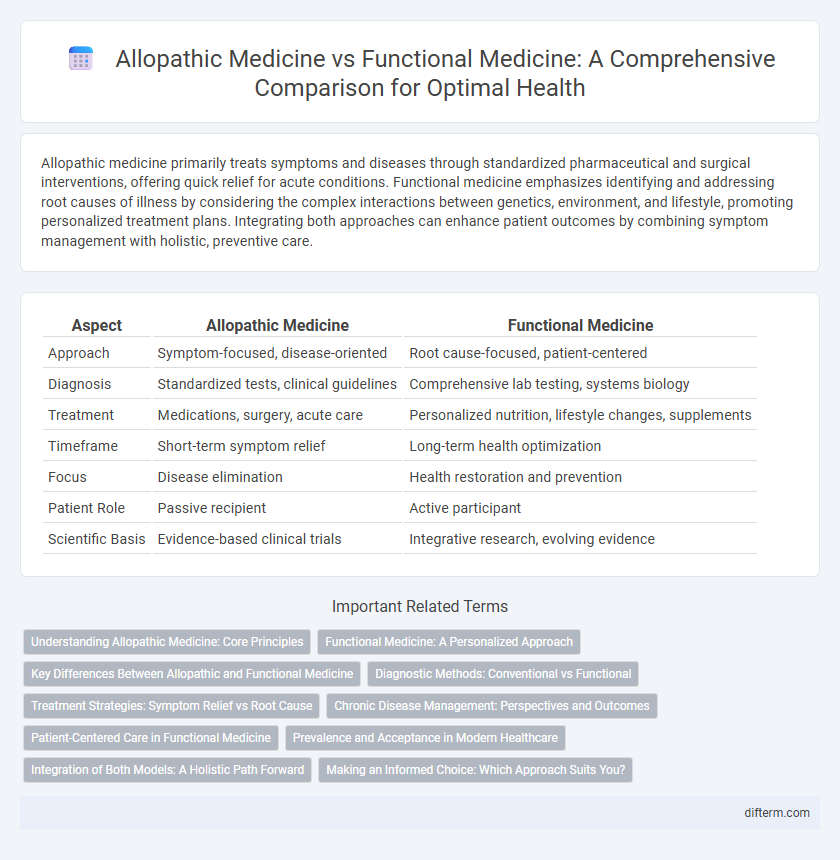Allopathic medicine primarily treats symptoms and diseases through standardized pharmaceutical and surgical interventions, offering quick relief for acute conditions. Functional medicine emphasizes identifying and addressing root causes of illness by considering the complex interactions between genetics, environment, and lifestyle, promoting personalized treatment plans. Integrating both approaches can enhance patient outcomes by combining symptom management with holistic, preventive care.
Table of Comparison
| Aspect | Allopathic Medicine | Functional Medicine |
|---|---|---|
| Approach | Symptom-focused, disease-oriented | Root cause-focused, patient-centered |
| Diagnosis | Standardized tests, clinical guidelines | Comprehensive lab testing, systems biology |
| Treatment | Medications, surgery, acute care | Personalized nutrition, lifestyle changes, supplements |
| Timeframe | Short-term symptom relief | Long-term health optimization |
| Focus | Disease elimination | Health restoration and prevention |
| Patient Role | Passive recipient | Active participant |
| Scientific Basis | Evidence-based clinical trials | Integrative research, evolving evidence |
Understanding Allopathic Medicine: Core Principles
Allopathic medicine, also known as conventional medicine, focuses on diagnosing and treating specific diseases primarily through pharmaceuticals, surgery, and other standardized interventions. It relies heavily on evidence-based practices grounded in scientific research and clinical trials to address symptoms and acute health conditions. Emphasizing symptom management, allopathic treatments aim to quickly alleviate illness through targeted therapies within established medical protocols.
Functional Medicine: A Personalized Approach
Functional medicine emphasizes a personalized approach by addressing the root causes of illness through comprehensive patient history, genetics, and lifestyle factors. Unlike allopathic medicine, which often targets symptoms with standardized treatments, functional medicine creates individualized care plans incorporating nutrition, exercise, and stress management. This approach enhances long-term health outcomes by promoting preventive care and patient empowerment.
Key Differences Between Allopathic and Functional Medicine
Allopathic medicine primarily focuses on diagnosing and treating symptoms and diseases using pharmaceuticals and surgical interventions, emphasizing evidence-based protocols. Functional medicine, on the other hand, takes a holistic approach by identifying and addressing the root causes of illness through personalized lifestyle changes, nutrition, and integrative therapies. Key differences include allopathic medicine's emphasis on symptom management and acute care versus functional medicine's focus on chronic disease prevention and system-wide balance.
Diagnostic Methods: Conventional vs Functional
Allopathic medicine primarily relies on standardized diagnostic methods such as blood tests, imaging scans, and physical examinations to identify specific diseases or conditions. Functional medicine employs a more holistic diagnostic approach, using comprehensive lab tests, genetic analysis, and detailed patient histories to uncover underlying root causes and systemic imbalances. Functional diagnostics emphasize personalized data and biomarkers, enabling tailored treatment plans that address the interconnected nature of chronic illnesses.
Treatment Strategies: Symptom Relief vs Root Cause
Allopathic medicine primarily focuses on symptom relief through standardized treatments such as pharmaceuticals and surgery, providing rapid alleviation of acute conditions. Functional medicine emphasizes identifying and addressing the root causes of diseases by evaluating genetic, environmental, and lifestyle factors to create personalized treatment plans. This approach often integrates nutritional counseling, hormone optimization, and detoxification strategies to promote long-term health and disease prevention.
Chronic Disease Management: Perspectives and Outcomes
Allopathic medicine primarily targets symptom relief and disease eradication through standardized pharmaceutical treatments and surgical interventions, often yielding rapid results in chronic disease management. Functional medicine emphasizes identifying and addressing root causes by integrating personalized lifestyle changes, nutrition, and holistic therapies, which may improve long-term health outcomes and reduce dependency on medications. Comparative studies indicate that combining both approaches can enhance patient-centered care and optimize chronic disease management outcomes.
Patient-Centered Care in Functional Medicine
Functional medicine emphasizes patient-centered care by addressing the root causes of illness through personalized treatment plans tailored to individual genetic, environmental, and lifestyle factors. Unlike allopathic medicine, which often focuses on symptom management using standardized protocols, functional medicine prioritizes holistic healing and long-term wellness. This approach fosters active patient participation, aiming to restore balance and improve overall health rather than merely suppressing symptoms.
Prevalence and Acceptance in Modern Healthcare
Allopathic medicine remains the dominant approach in modern healthcare, widely accepted due to its strong foundation in evidence-based practices and regulatory approval across global medical institutions. Functional medicine is gaining traction by emphasizing personalized treatment and root cause analysis but is still considered complementary rather than mainstream, with limited integration in conventional clinical settings. Patient demand and growing research into chronic and complex diseases drive increasing acceptance and incorporation of functional medicine principles within integrative healthcare models.
Integration of Both Models: A Holistic Path Forward
Integrating allopathic medicine and functional medicine creates a comprehensive healthcare approach that addresses acute symptoms while targeting root causes of chronic conditions. Allopathic methods offer evidence-based treatments and advanced diagnostics, whereas functional medicine emphasizes personalized care, lifestyle factors, and prevention strategies. This synergy enhances patient outcomes by bridging conventional protocols with holistic wellness principles, promoting sustained health and disease management.
Making an Informed Choice: Which Approach Suits You?
Allopathic medicine emphasizes symptom treatment using pharmaceuticals and surgical interventions, offering rapid relief for acute conditions and established protocols for emergencies. Functional medicine takes a holistic approach by addressing root causes through personalized lifestyle, nutrition, and genetic factors, aiming for long-term wellness and disease prevention. Understanding individual health goals, chronic conditions, and preferences for treatment style helps determine whether conventional or integrative care best suits your needs.
Allopathic Medicine vs Functional Medicine Infographic

 difterm.com
difterm.com